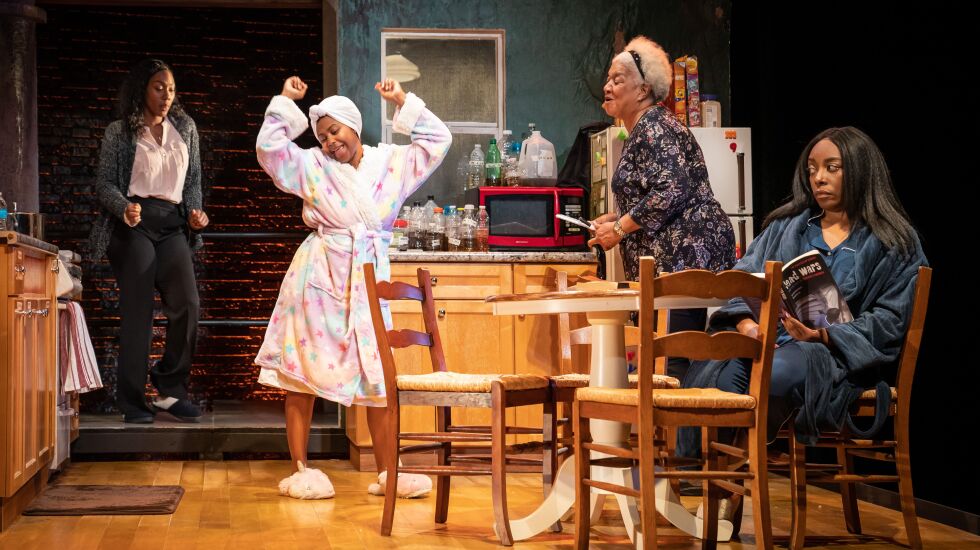
There’s no curtain call for the brilliant ensemble of Victory Gardens’ “cullad wattah,” Erika Dickerson-Despenza’s harrowing drama about the Flint, Michigan, water crisis. Instead, the production, running through July 17, ends in a blackout that leaves audience clapping as the house lights come up, gradually realizing the cast isn’t coming out for the traditional bow. It’s a powerful, tacit acknowledgement that any sort of celebratory shift would dilute the production’s final, deeply troubling moments.
Dickerson-Despenza hits hard in this can’t-look-away drama about the devastation that ensued after the city of Flint’s 2014 switch from using water pipelined from Detroit and Lake Huron to water from the Flint River. Set over Thanksgiving 2016, “cullud wattah” hinges partially on a class-action suit Flint residents filed against state and local officials and General Motors (among others). The suit was settled last year for $626 million.
“cullud wattah” doesn’t get to the lawsuit’s resolution. Instead, it focuses on the toll — financial, emotional and physical — on three generations of women whose lives were impacted by their exposure to water that tested time and again for unsafe levels of a smorgasbord of toxins, lead predominant among them.
Director Lili-Anne Brown works her magic, although calling it “magic” is a disservice to the kind of deep work required to get an ensemble to play an immediate family — a grandmother, her two daughters and two grandchildren — with such bone-authenticity.
The setting is the family home, recently valued at $12,500 thanks to Flint’s water issues. That grim appraisal makes moving elsewhere impossible for big ma (Renee Lockett) and her progeny. Daughter ainee (Sydney Charles) is on her seventh pregnancy, the previous six having ended in miscarriages. Ainee’s sister marion (Brianna Buckley) is the family breadwinner, holding down a job with General Motors when she’s not shuttling her youngest daughter, plum (Demetra Dee), to chemo treatments that will hopefully put the child’s leukemia into remission. Plum’s teenage older sister reesee (Ireon Roach) has found hope and substance in praising the Yoruban water goddess Yeyé Omo Eja, her offerings of dance and fruit as signs of radiant high hopes as ephemeral as bubbles.
Every last moment (even the scene changes) is part of an airtight tapestry of intentional, impeccable storytelling. That story spins with a surreal, sometimes nightmarish clarity through the daily lives of people whose government failed to provide them with the most basic of services.
Yet for all its unapologetic refusal to soften the edges of a tragedy that is still playing out, “cullud wattah” is also a very funny production, albeit funny with the kind of humor humans reach for when the only emotional options are laughing or crying until you’re all cried out. Finally, it’s a celebration of a family tested and tried but still surviving.
The tension ebbs and flows as secrets and choices that would vex the Solomon of big ma’s Bible bubble to the surface like the blisters and rashes from the contaminated water that spread over marion’s torso.
Throughout, water is inescapable in Sydney Lynne’s set design. A white tub sits center stage throughout, glistening like Chekhov’s gun. There’s a toilet next to it, and a sink. In the kitchen, a tally of water bottles needed for Thanksgiving dinner is pasted to the fridge. Downstage, a lawn of bottled water the color of tea sits on piles of dirt, glistening cloudily.
Twice in the production the entire cast takes the stage wearing all white, a holy color in the Yoruban tradition, singing what initially sounds like the ancient strains of the gospel hymn “Wade in the Water.” Listen harder. It’s “lead in the water” they’re singing, a dirge that sounds more haunting than sacred context of Flint’s water crisis.



.png?w=600)



